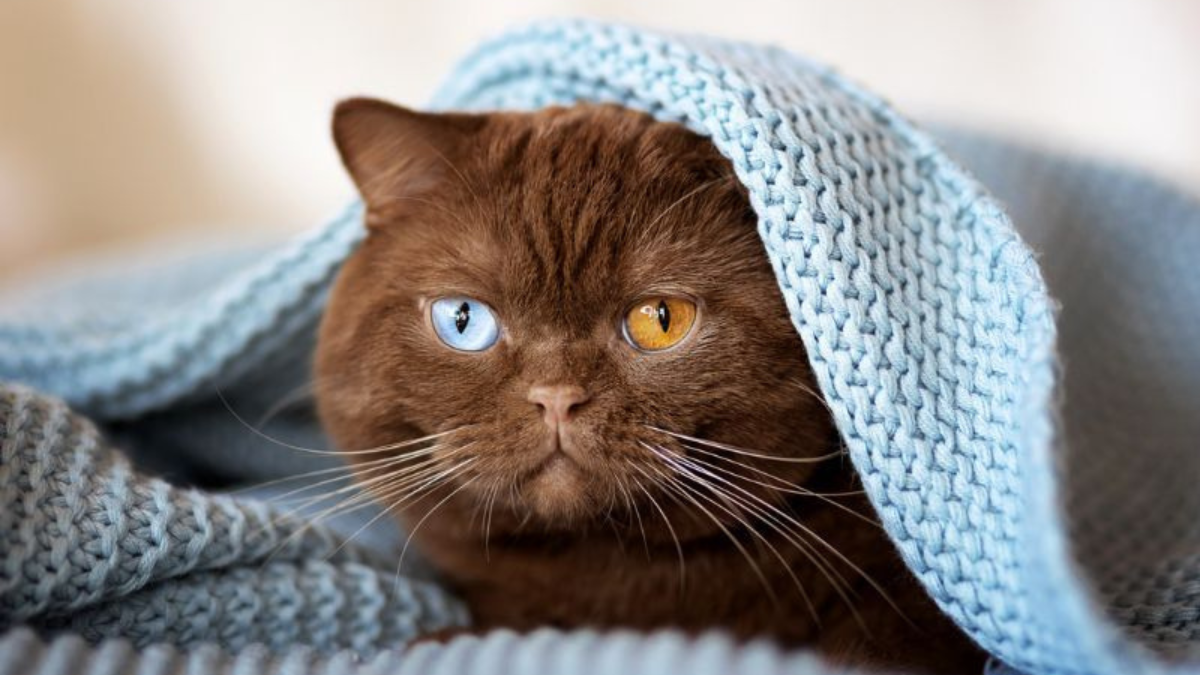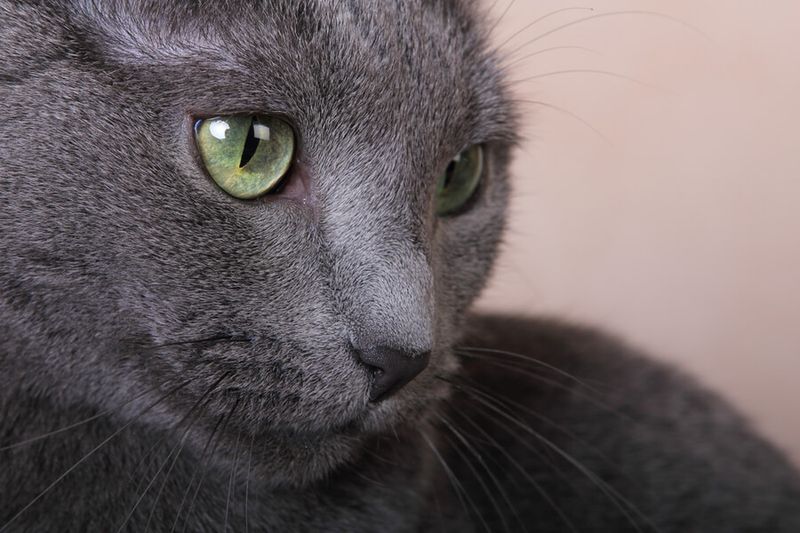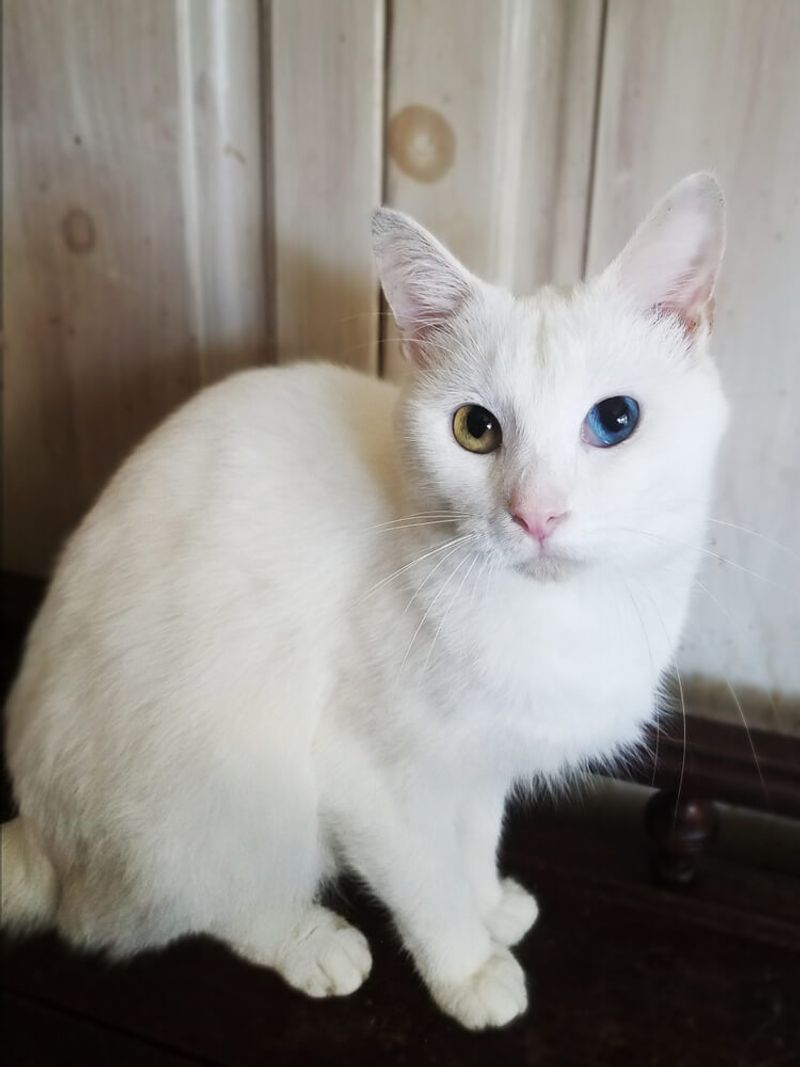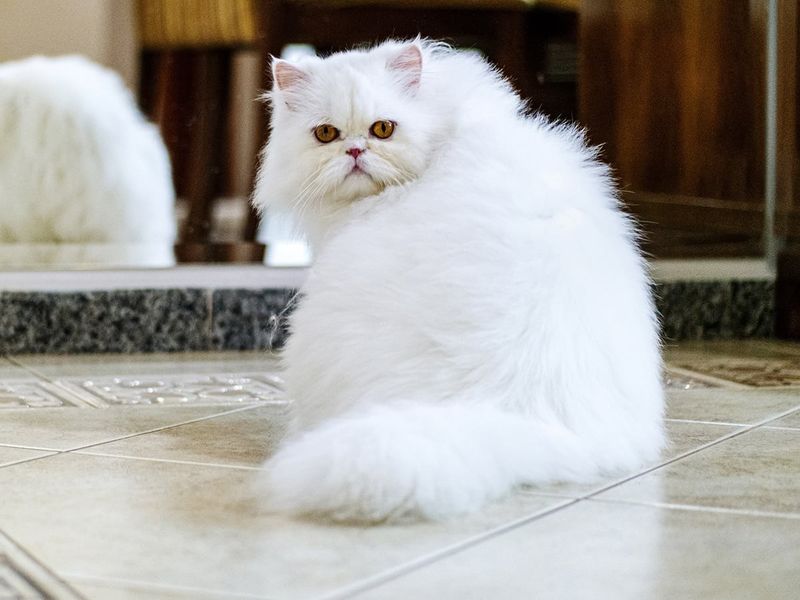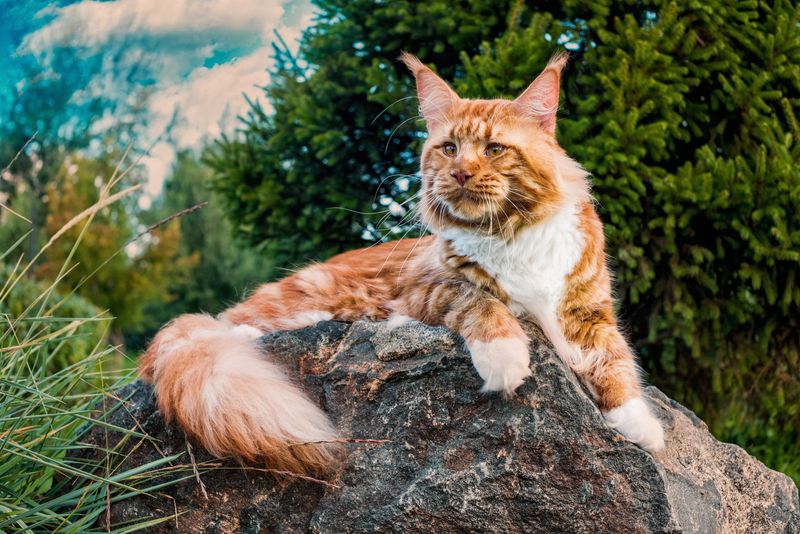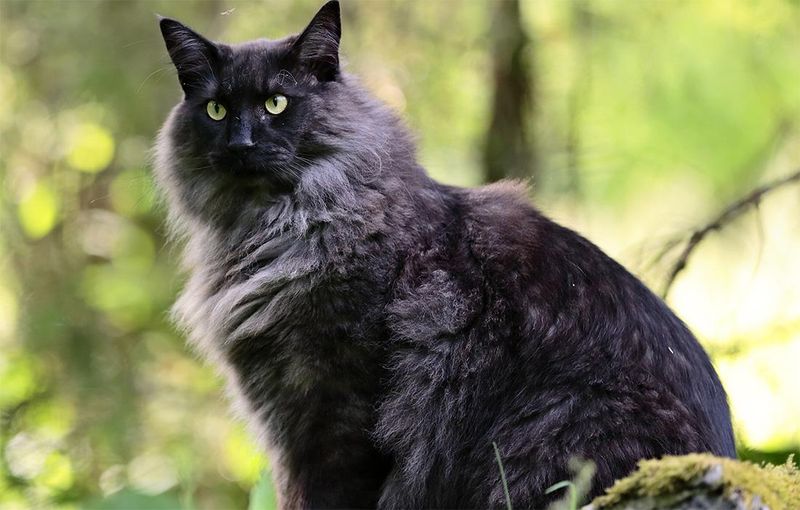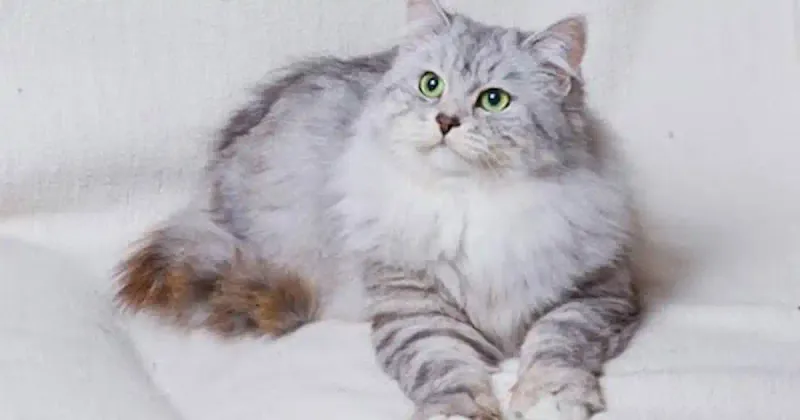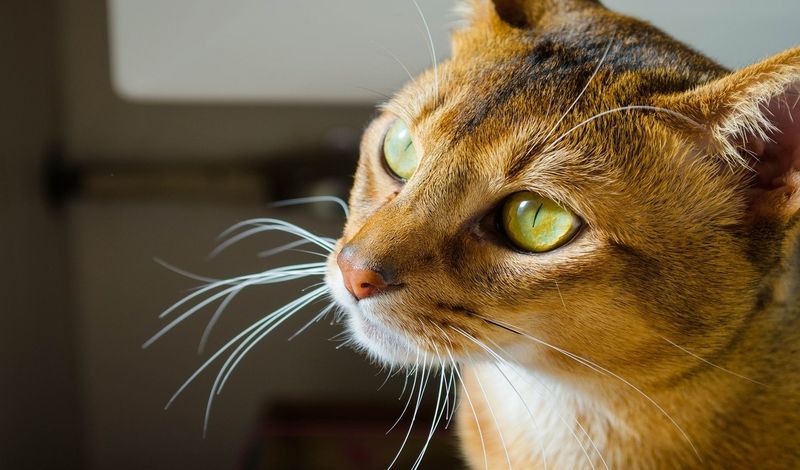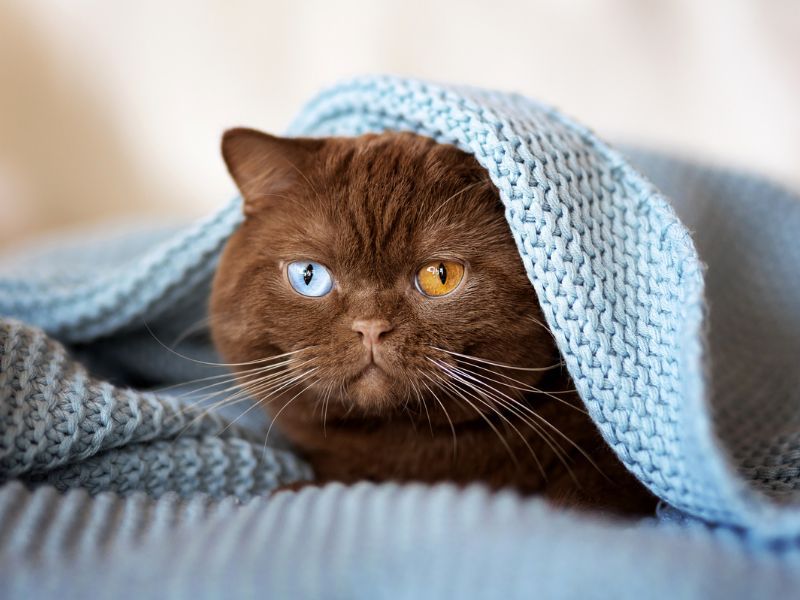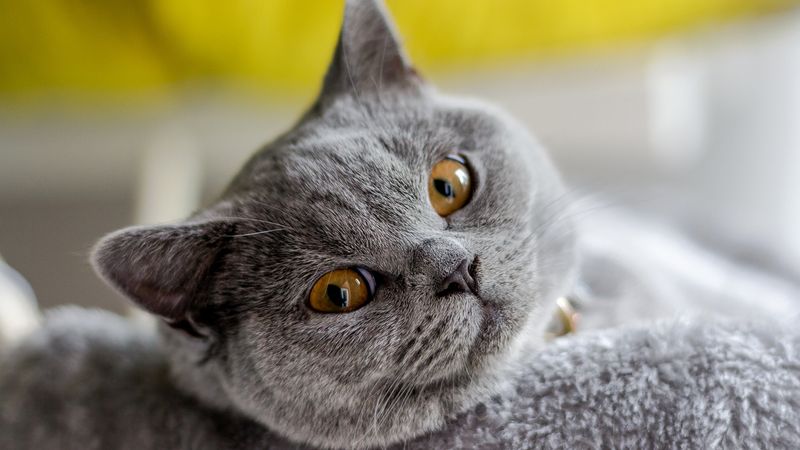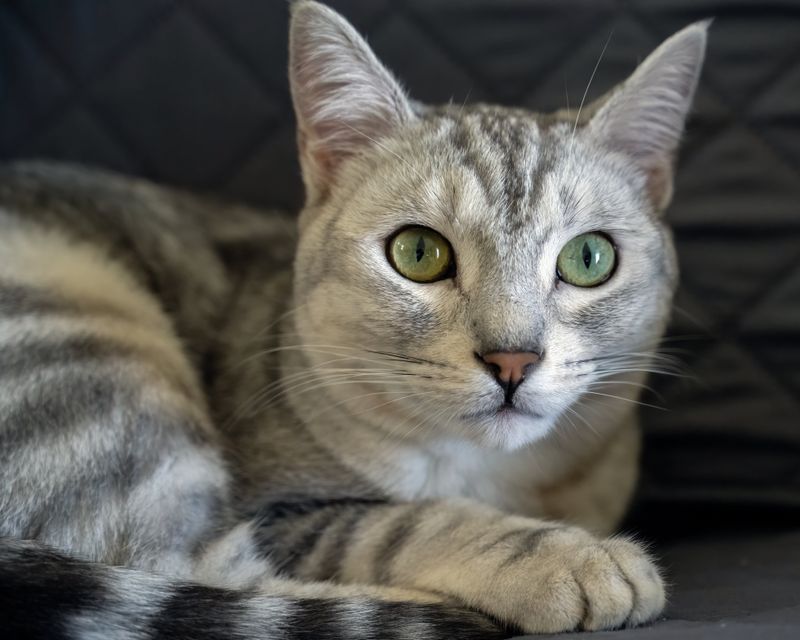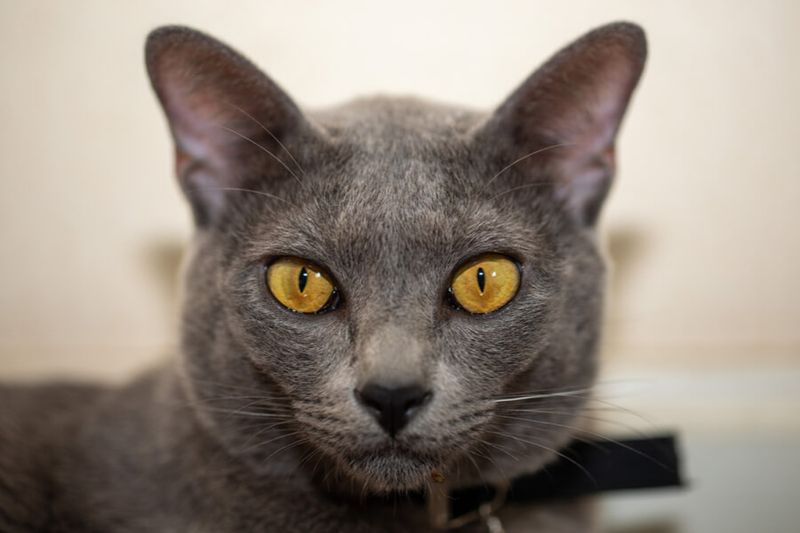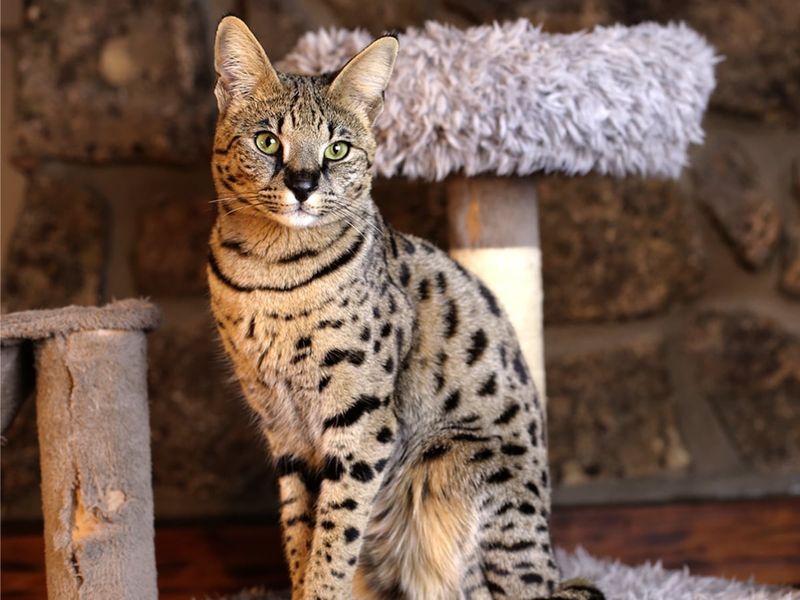📖 Table of Content:
Cat lovers are well aware that each feline has a personality all its own. Some cats are social butterflies, eager for constant interaction and affection. Others, however, are more reserved and content doing their own thing.
Certain breeds are known for their independence and strong-willed nature. These cats often enjoy solitude, explore on their own terms, and don’t rely on human companionship for comfort. They may be affectionate at times, but always on their own schedule.
Sharing a home with an independent cat means respecting boundaries and appreciating subtle expressions of connection. These cats value their freedom and are perfectly content without being the center of attention. For those who admire quiet companionship, these breeds offer just the right balance.
1. Russian Blue
Russian Blues maintain a polite distance from their humans. These silver-blue beauties prefer observing household activities from elevated perches rather than participating in them.
They’ll tolerate occasional petting but quickly let you know when they’ve had enough. Russian Blues establish strict boundaries and expect you to respect them without question.
Despite their standoffish reputation, they form deep bonds with their chosen humans – they just express affection on their own terms. These cats excel at entertaining themselves and don’t suffer from separation anxiety when left alone for reasonable periods.
2. Turkish Van
On their own time and terms—that’s how Turkish Vans roll. Their nickname, “the cat that swims,” comes from an innate love of water, something they’ve embraced without any training or coaxing from humans.
Fiercely independent, Turkish Vans remain playful well into adulthood but prefer interactive toys over human playmates. They’ll seek attention when they want it, not when you offer it.
Their intelligence makes them excellent problem-solvers who can entertain themselves for hours. Unlike needier breeds, they won’t demand constant affection and might actually prefer if you’d just leave them to their important cat business.
3. Persian
With their regal presence and cool demeanor, Persians define feline aristocracy. Those iconic flat faces conceal a personality that thrives on quiet adoration—not close encounters.
They’ll lounge regally on furniture, silently judging your life choices while requiring minimal interaction. Persians appreciate quiet environments and prefer predictable routines over spontaneous play sessions. Their laid-back temperament means they rarely seek attention.
When a Persian does grace you with their presence, consider yourself honored – it’s entirely on their terms. These cats excel at creating boundaries and will retreat to private spots when they’ve reached their social limit. Their self-contained nature makes them perfect for busy households.
4. Maine Coon
Maine Coons balance independence with selective sociability. These gentle giants appreciate having their own territory within your home where they can retreat without interruption.
They’ll follow household activities with curious eyes but maintain a comfortable distance until they decide interaction is worthwhile. Maine Coons show affection through proximity rather than demanding cuddles.
Their self-sufficiency traces back to their working cat heritage when they hunted independently on farms. These cats form bonds with family members but don’t require constant validation. A Maine Coon might sleep near you rather than on you – their way of showing they acknowledge your existence without compromising their autonomy.
5. Norwegian Forest Cat
These cats bring more than beauty—they bring a history of resilience. Norwegian Forest Cats earned their independence by weathering harsh Scandinavian winters without human help.
They appreciate having climbing opportunities and outdoor access where they can exercise their natural hunting skills. Norwegian Forest Cats form bonds with family members but don’t demand constant attention or validation.
Their thick double coats and muscular builds reflect their self-sufficient nature. These cats might acknowledge your presence with a dignified head bump before continuing with their important cat business. They excel at entertaining themselves and view humans as roommates rather than necessary companions.
6. Siberian
Don’t let their affectionate looks fool you—Siberians are fiercely independent at heart. Their self-reliance stems from generations spent enduring Russia’s brutal weather on their own.
While they may tolerate family members, Siberians rarely seek out cuddle sessions or demand attention. They prefer monitoring household activities from strategic vantage points, maintaining control over their environment.
Their intelligence lets them solve problems without human assistance. Siberians appreciate having multiple escape routes and private spaces throughout your home. When they do choose interaction, it’s brief and entirely on their terms – usually coinciding with mealtimes rather than genuine desire for companionship.
7. Abyssinian
Abyssinians embody feline independence through constant motion. Unlike lazy lap cats, these active felines prefer exploring every inch of their territory to settling down for cuddles.
Their curiosity drives them to investigate everything independently, solving puzzles and creating games without human assistance. Abyssinians form connections with their families but maintain healthy boundaries.
These cats appreciate interactive toys that don’t require human participation. Their ancient Egyptian heritage shines through in their regal bearing and self-assured attitude. When an Abyssinian graces you with attention, understand it’s because they’ve chosen to acknowledge you – not because they need emotional validation.
8. British Shorthair
Few cats match the emotional poise of the British Shorthair. These unshakable felines watch life unfold around them with calm indifference and effortless grace.
They tolerate brief petting sessions but quickly communicate when they’ve had enough physical contact. British Shorthairs prefer parallel play – being near you while engaged in separate activities rather than demanding interaction.
Their independence makes them excellent companions for busy professionals. These cats don’t hold grudges when left alone and won’t destroy property out of separation anxiety. The British Shorthair’s self-contained personality extends to their relationships with other pets – they’ll acknowledge housemates without forming deep attachments.
9. Chartreux
Independent yet quietly affectionate, Chartreux cats are the masters of understated presence. Their roots trace back to French monasteries, where their peaceful nature fit perfectly with a life of silence and reflection.
They’ll quietly follow you from room to room but maintain a respectful distance rather than demanding attention. Chartreux cats communicate through expressive eyes and soft chirps instead of demanding meows.
Their hunting heritage makes them excellent self-entertainers who don’t rely on humans for stimulation. These cats appreciate routine and predictability, establishing their own schedules regardless of your preferences. A Chartreux might sleep near you rather than on you – their subtle way of acknowledging your relationship without surrendering their independence.
10. Egyptian Mau
Egyptian Maus maintain their ancient wild spirit despite domestication. These spotted athletes move with purpose and pride, choosing when and how they interact with their human housemates.
They appreciate respectful relationships where their boundaries remain unchallenged. Egyptian Maus form selective bonds but never surrender their independence even to beloved family members.
Their intelligence makes them excellent problem-solvers who rarely need human assistance. These cats retain strong hunting instincts and prefer interactive play that mimics natural prey behaviors rather than cuddle sessions. An Egyptian Mau might bring you hunting trophies not as gifts but as evidence of their self-sufficiency.
11. Korat
With roots deep in Thailand’s forests, Korats embody a natural self-sufficiency. Their rare silver-blue coats once gleamed in the wild, long before they became symbols of luck and affection in Thai homes.
They observe household activities with intelligent green eyes, assessing situations before deciding whether participation serves their interests. Korats form deep bonds with specific family members but maintain their emotional independence.
Their quiet confidence means they rarely seek validation through attention-seeking behaviors. These cats appreciate having multiple private spaces throughout your home where they can retreat undisturbed. A Korat might choose to sit near you during quiet evenings – their subtle way of acknowledging your relationship while maintaining personal boundaries.
12. Savannah
There’s no mistaking the wild essence of a Savannah cat. These striking hybrids—part domestic feline, part African serval—are known for their independence and selective affection.
They require substantial territory and environmental enrichment to satisfy their wild instincts. Savannahs form relationships with family members but maintain emotional distance even from their favorite people.
Their intelligence makes them excellent problem-solvers who rarely require human assistance. These cats communicate boundaries clearly and expect them to be respected without exception. A Savannah might acknowledge your presence with a dignified nod before continuing their important exploration – their way of maintaining the relationship on their terms.
